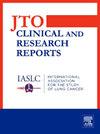Recent Survival Gains in Stage IV NSCLC by Sociodemographic Strata
IF 3.5
Q2 ONCOLOGY
引用次数: 0
Abstract
Introduction
The management of stage IV NSCLC has been transformed by recent innovations. Nevertheless, access to medical innovations varies across sociodemographic groups in the United States, which may affect the rate of outcome improvements. Our objective was to evaluate the recent real-world gains in the survival of patients with stage IV NSCLC across sociodemographic groups.
Methods
The National Cancer Database was queried for treated patients diagnosed with stage IV NSCLC between 2010 and 2020. Data was analyzed in three eras (2010–2013, 2014–2017, and 2018–2020). Two-year survival was assessed using the Kaplan-Meier method. Adjusted mortality risk was calculated using stratified Cox analysis.
Results
A total of 393,586 patients with stage IV NSCLC received treatment. Chemotherapy administration decreased (from 64.8% to 25.1%), radiation therapy decreased (from 54.3% to 27.6%), and immunotherapy increased (from 2.0% to 51.8%). Between eras 1 and 3, median survival increased by 53.7% (6.7–10.3 mo); nevertheless, not all groups improved at the same pace. The median survival increased by 81% (from 8.3 to 15.0 mo) for Hispanic patients, by 54.7% (from 6.7 to 10.3 mo) for non-Hispanic Blacks, and by 46.7% (from 6.6 to 9.6 mo) for non-Hispanic Whites. The median survival of uninsured patients increased from 5.8 to 7.2 months (24.1%), whereas that of patients with private insurance increased from 8.6 to 14.7 months (70.9%).
Conclusions
The survival of patients with treated stage IV NSCLC has improved considerably over the past decade. Nevertheless, expected survival and the pace of improvement differed across sociodemographic groups. Further studies to understand this outcome variability may enhance the effectiveness and equity of NSCLC treatments.
近期IV期非小细胞肺癌的社会人口分层生存率增加
IV期非小细胞肺癌的管理已经被最近的创新所改变。然而,在美国,不同的社会人口群体获得医疗创新的机会各不相同,这可能会影响结果改善的速度。我们的目的是评估不同社会人群中IV期非小细胞肺癌患者的生存状况。方法查询国家癌症数据库2010年至2020年期间诊断为IV期NSCLC的治疗患者。数据分三个时期(2010-2013年、2014-2017年和2018-2020年)进行分析。采用Kaplan-Meier法评估两年生存率。采用分层Cox分析计算校正死亡率风险。结果共393586例IV期NSCLC患者接受了治疗。化疗减少(从64.8%到25.1%),放疗减少(从54.3%到27.6%),免疫治疗增加(从2.0%到51.8%)。在第1期和第3期,中位生存期增加53.7%(6.7-10.3个月);然而,并不是所有的小组都以同样的速度进步。西班牙裔患者的中位生存期增加81%(从8.3个月增加到15.0个月),非西班牙裔黑人患者的中位生存期增加54.7%(从6.7个月增加到10.3个月),非西班牙裔白人患者的中位生存期增加46.7%(从6.6个月增加到9.6个月)。未参保患者的中位生存期从5.8个月增加到7.2个月(24.1%),而参保患者的中位生存期从8.6个月增加到14.7个月(70.9%)。结论:经过治疗的IV期非小细胞肺癌患者的生存率在过去十年中有了显著提高。然而,不同社会人口群体的预期生存率和改善速度有所不同。进一步研究了解这种结果的可变性可能会提高非小细胞肺癌治疗的有效性和公平性。
本文章由计算机程序翻译,如有差异,请以英文原文为准。
求助全文
约1分钟内获得全文
求助全文
来源期刊

JTO Clinical and Research Reports
Medicine-Oncology
CiteScore
4.20
自引率
0.00%
发文量
145
审稿时长
19 weeks
 求助内容:
求助内容: 应助结果提醒方式:
应助结果提醒方式:


